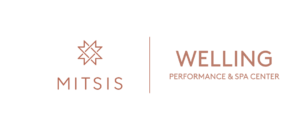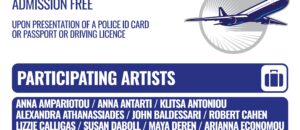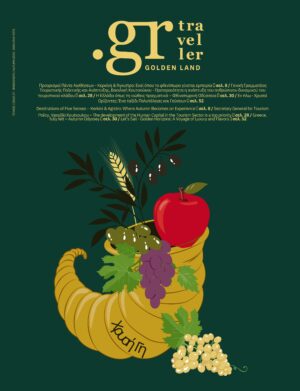
Interview with the Deputy Minister of Tourism, Ms Elena Rapti
to Panagiota Surtzi
The consolidation of Greece as a top attractive destination and at the same time to become a model example of sustainable tourism development is the vision of the Deputy Minister of Tourism, Ms Elena Rapti for the coming years. The Deputy Minister with her rich social and political work, talks about the ministry’s plans for tourism education and alternative forms of tourism as well as her work on the “One in Five” programme on child abuse.
Mrs Rapti, as Deputy Minister of State for Tourism, what is your vision for the industry in the coming years?
The Government’s goal, and my own, is that in the years to come, Greece will establish itself as a leading attractive destination worldwide, with year-round tourism, and at the same time as a model of sustainable tourism development. We are therefore called upon to answer two questions. First, how the Greek tourism development of the future will be built on the basis of the triptych quality – sustainability – balance. We want a tourism with more alternative options, oriented towards sustainability, with diffusion of development throughout the Greek region and a longer duration. Secondly, how to lay the foundations for a tourism education that will provide tourism workers and managers with the necessary skills to meet the challenges of the new era.

”The upgrading of public tourism education, in addition to need,
is key to the success of our efforts.”
What are your plans for tourism education and training?
The upgrading of public tourism education, apart from being a necessity, is key to the success of our efforts. I am currently working with the Ministry of Education to strengthen it and resolve chronic issues of the ASTE. Also, after decades, the Ministry of Tourism is promoting permanent recruitment of teaching staff in IEKs and at the same time we are considering further strengthening of organic teaching posts in all our educational units. From 2024, permanent recruitment is planned for 23 administrative posts in ASTE and IEK. In addition, we are implementing experimental specialties in IEK Tourism, such as for executives specializing in the fields of Room Management and Travel and Tourism Business. We are implementing an international tender for new modern textbooks at the ASTE, we are launching the provision of passes to students of IEK and ASTE for public transport and we are evaluating within 2024 educational structures and units of the Ministry of Tourism for a holistic transformation of the tourism education provided. Upgrading the skills of tourism workers is also crucial. We are starting immediately with the largest subsidised training programme for workers and temporarily unemployed in the tourism sector with at least 18,000 participants. We use resources from the Recovery Fund and offer training programs in 7 specialties with distance asynchronous training and certification.
What would you tell young people to think about tourism as a career/entrepreneurial field?
When an industry is dynamically growing, it creates a “world” of professions with a present and a future. Young people now have the opportunity to work not only in traditional tourism professions, but also in newer ones linked to thematic tourism and in a variety of dynamic and well-paid sectors such as digitalbooking, marketing, IT, construction – it is very easy and potentially profitable to choose a profession that directly or indirectly contributes to or is influenced by tourism. 80% of ASTE students are already absorbed by the labour market within the first semester after graduation. But there is also a lot of new tourism investment. Greece is one of the top investment destinations right now. This means an ever-increasing need for staff and stable professional rehabilitation.

The provision of high quality services
is a factor in the safety of our visitors
and is a prerequisite for tourism development
every Greek destination.
And what would you tell people who travel to Greece to discover. What kind of experiences and what kind of incentives can be given to them to visit Greek destinations in the context of the special forms of tourism that have been developed?
Globally, more and more travellers are seeking unique experiences. Special forms of tourism ensure both targeting the specific interests of each individual and sustainability as they are low-impact, inextricably linked to local identity, history and geography and linked to activities that go beyond the typical summer season.

Of particular interest in Greece are sectors in which we have a competitive advantage, which we have not yet fully exploited. Such examples are marine and diving tourism, mountain tourism, health and wellness tourism, pilgrimage tourism, wine tourism and, of course, gastronomic tourism and agri-tourism, which we are promoting through the Recovery Fund, but also through a series of other actions.
You recently announced the official launch of cooperation with the World Health Organization, which will include, among other things, the medical care infrastructure on the country’s islands. What does this mean in practice for destinations and their visitors?
As Deputy Minister of Tourism, responsible for Special Forms of Tourism and Medical Tourism, I recently met with Joao Breda, Head of the Athens Office of the World Health Organization. We discussed the official launch of our cooperation and the planning, which seeks to ensure the health of workers in the tourism industry, the quality of medical services in tourism and the medical care infrastructure on our country’s islands. The provision of high quality services is a factor in the safety of our visitors and is a prerequisite for the tourist development of any Greek destination.
In addition to your tourism portfolio, you are actively involved in projects to prevent child sexual abuse. Tell us a little about your action and what results you have had so far.
I have been working tirelessly to prevent child sexual abuse since 2013. In these 10 years as Coordinator of the Council of Europe’s “One in Five” Campaign in Greece, we have carried out over 900 awareness-raising activities for children and parents throughout the country. with the campaign’s information tools, which teach the underwear rule, creating a safety net for thousands of children and we continue with the same intensity. My cooperation with the Council of Europe and above all with the current Government led to the drafting of the first National Action Plan for this purpose, involving 11 ministries with dozens of policies. I have the honour of being assigned the role of National Coordinator for the Prevention and Response to Sexual Abuse and Exploitation of Minors, under which I monitor and facilitate the implementation of the NAP. The Plan is under the authority of the Minister of State, is being implemented smoothly and special emphasis is placed on important reforms that are planned and will change the conditions of prevention and management of cases of sexual abuse of minors, for the benefit of children.

















